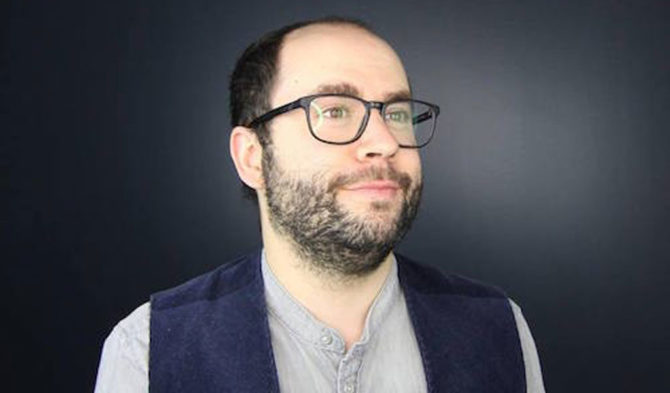Sam Dunsiger Talks TFS Academic Accommodations to Kick Off National AccessAbility Week
“Asking for support doesn’t take away any sense of independence – in fact, it does the opposite. Asking for help when you need it actually enhances your own independence, because you’re advocating for yourself and your needs.”
Sam Dunsiger knows better than most the empowerment that comes from self-advocation – after all, he’s been on both sides of that kind of request for help.
As someone who’s lived his whole life with a stutter, he’s been on the receiving end of academic supports and accommodations that helped him thrive as he pursued both his Bachelor of Journalism and Master of Education degrees.
And now, as Toronto Film School and Yorkville University’s Academic Accommodations and Accessibility Specialist, he gets to use his personal experience as a sort of how-to guide to working collaboratively with students to help them, too, eliminate/reduce any of the disability-related barriers they may face in their pursuit of higher education.
“I’ve been on both sides of the process, so I feel that definitely gives me an inside scoop – and it also it helps me develop a better rapport with some students,” Dunsiger said during a recent interview coinciding with the closing of May as Speech and Hearing Month and the ramping up of National AccessAbility Week (May 30-June 5).
“The most rewarding part of my job is honestly simple things like when a student comes back to me and says, ‘Thanks so much for your help. You’ve been a huge relief.’ Seeing the impact that I make is part of why I love doing what I do.”
Born and raised in Toronto, Dunsiger comes from a public relations and content marketing background – a career path he followed for more than a decade until, about two years ago, he began to feel the pull towards a different, more fulfilling path.
“I had sort of an existential career crisis, where I realized that I didn’t want to stay in that field forever. I got burnt out by the writing process, and I wanted to do something different – something more hands-on and collaborative, where I’d be working one-on-one with people,” he explained.
“So that sort of drew me to student affairs and student services, and then from there, given my own personal experiences with disability, I was drawn even more into accessibility and accommodations.”

Since joining the Toronto Film School family in November 2020, Dunsiger has dedicated himself to ensuring all students who come to him for help are equipped with the tools they need to succeed in their studies, no matter their disability – be it a learning disability, physical disability, or mental health disability.
Noting that no two disabilities – even the same disabilities – look the same for every student, Dunsiger explained that it’s important to meet students where they are and cater their accommodations to their individual needs.
“When we work with students, we take their individual context and circumstances into account and we work with them to develop an accommodation plan that works for them,” he explained.
“So, if they sometimes struggle with assignment deadlines or due dates, it could be flexibility around that. Or it could be extra time for testing. Or, if they need course materials in an alternative format, it could be something like that. It really depends on what the student needs.”
Dunsiger said that, in his line of work, he also has to battle against people’s misconceptions about what disability is – namely, that it’s a binary concept and that you’re either considered disabled or you’re not.
The truth, he said, is that disability is a lot more complex and fluid than that. That while some disabilities are permanent, others can be temporary or episodic. And that disabilities can also be very contextual and environmental, making people feel more or less disabled, depending on the different circumstances they’re facing in the moment.
“In my case, when I’m at the National Stuttering Conference where everybody stutters and it’s the norm, I don’t really feel that my stuttering is a disability there. But if I’m in class and I have to give an oral presentation in 15 minutes and not a second more, I’m going to feel more disabled,” he said, drawing on his own experience to explain the fluidity of disability.
“The thing I emphasize to students about academic accommodations, is that they can work the same way – they can be very fluid, too. We can set up accommodations at any time during a students’ program, and they can be permanent or for one semester only. It really depends on the student’s needs.”
One of the biggest barriers Dunsiger faces in his work, he said, is helping students overcome their reluctance to seek academic accommodations out of fear of being stigmatized.
To those students, Dunsiger said there are two important things to note:
1) That being on the receiving end of academic accommodations in no way impacts your status as a student or the rigorous standards of your studies at Toronto Film School.
2) You are not alone – a lot more students with both visible and invisible disabilities are seeking help and being granted academic accommodations than you may realize.
In fact, Dunsiger said that in April alone, his Academic Accommodations and Accessibility office saw more than 70 students come forward to request help – a number he expects will only grow as enrolments in Toronto Film School and Yorkville University’s programs grow.
“It’s really rewarding work,” he said. “Even if I can make just a really minor difference in a student’s life or make things even a little bit easier for them in their studies, it’s all worth it.”
Students wishing to book a confidential intake appointment with Dunsiger’s Accessibility and Academic Accommodations Office can do so through the Jane app at https://yorkvilleu.janeapp.com/
Alternately, students who have questions or who would like to chat with an accessibility specialist can email [email protected]


